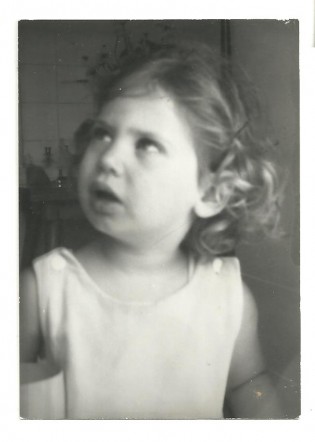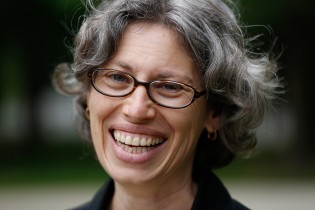Confession from an Israeli

In our years in Boston, I discovered, to my surprise, that I have a very hard time feeling solidarity with the local Jewish community.
by Tamar Biala
Spinoza got the better of me long ago. My Judaism is not based on faith in the Torah as the divinely revealed word of God. Rather, it’s based chiefly on a national identification with the Jewish people, on the feeling of belonging and shared responsibility for its fate, on being drawn to Jewish culture, and the motivation to help shape it.
I identify with ideas and principles in Tanakh and the tradition as it developed over the generations, and accept upon myself the mitzvot, as best I can (while also rejecting other ideas and principles, and some mitzvot, as best I can). I feel entirely a part of the Jewish people; for better or worse, I feel responsible for the fate and the essential character of the people as a whole. And this is the me who I brought with me when we moved to America three years ago, when I was 43.
When we arrived, the chief anxiety that I encountered among the Jews with whom I became friendly, was for the Jewish identity of the next generation. While worrying about Jewish existence was very familiar to me, it was not for spiritual survival, but physical. In Israel, the continued existence of Jewish identity is clear; what is less clear, of course, is how this identity will survive in the Middle East, and by the same token, what is the nature of the Jewish identity worth preserving, developing, fighting for, and sacrificing, even dying for. My question had less been how to preserve my children’s Jewish identity, but what Jewish identity do I want to pass on to them? A question, not of strategy, but of essence.
In Israel, this sense of the continuity of Jewish survival is natural. Responsibility for Jewish physical and cultural survival is basic and is internalized from early childhood on through schools, youth groups, the army, and volunteer organizations. This sense of responsibility has wonderful sides: youth mature earlier, the sense of solidarity – change though it does – endures, and Jewish culture flourishes in wonderfully creative and riveting ways. Yet there are also dark sides to this unmistakable Jewish identity: chauvinism and patriotism that cost ‘the other’ dearly, racist interpretations of Scripture, abuse and exploitation of religious institutions for brutality and injustice, and more.
In our years in Boston, I discovered, to my surprise, that I have a very hard time feeling solidarity with the local Jewish community. Personally, I’ve made new and wonderful connections, and strengthened some old ones. I get and give love, and actively participate in the synagogues we’ve joined, but overall, I can’t shake off my severe judgment of the choice to remain in exile. I’m perplexed to discover just how much my worry for the “Jewish people” all these years seems to be limited to those who dwell in Zion (and there, largely to the Zionists). Again and again I wonder: Can I change my beliefs and accept the choice of exiled Jewry to stay here and develop a Jewish culture of their own?
Some days I feel the Jewish people is split into sub-peoples who don’t share a common fate. I am utterly aware of how unjust my judgment is: American Jewry, in one way or another, has, does, and will support Israel; and, anyway, what the hell am I talking about – every fellowship I’ve ever gotten that enabled me to study in university, learn in a beit midrash, that paid my salary for teaching, and enabled me to publish the book that is my life’s dream come true, all came from American Jews who have tried to support me, and support the Zionist enterprise. Is it the drastic difference in daily life between Israel and American Jewry that keeps me from accepting the latter, and feeling some sense of belonging? If this exile were more miserable, would my judgment be more easily dissolving? In the end, I understand the tension between Babylonia and Israel that I encountered so often in the Talmud: The jealousy, competition, resentments, and anger.
I ask myself, what is “Jewish fate”? Is it possible to speak of one “Jewish fate”? Will I, can I, agree to live a Jewish fate that isn’t Israeli?
I understand it would be worth it for me to grapple with these questions rather than avoid them, while contenting myself with waiting, exhausted and embittered, for our return to Israel, to my natural community. I take it upon myself to try to accept the fact that there always was and always will be an exile, that just as I am pluralistic when it comes to how different Jews shape their relations to Jewish culture, to Torah and mitzvot, so must I try to be pluralistic when it comes to the place of Israel in their Jewish identity. But, somehow, it’s very hard for me. Very, very hard.
About the Author
 Tamar Biala, currently a scholar at the Hadassah-Brandeis Institute, is engaged with Jewish feminism as a writer and lecturer. She received her BA in Jewish studies and in literature at the Hebrew University, and her MA in women’s studies and Jewish studies at the Schechter Institute. Her master’s thesis, directed by professor Tamar Ross, was on “Feminist Theology’s Critique of Divine Transcendence as a Means of Changing Conceptions of the ‘Self.'” She has taught at IASA, Jerusalem’s high school for gifted students, at the Hartman Institute’s teacher training program, in pluralistic batei midrash in Israel, and for the Israel Defense Forces. She has written in feminist theology and is the co-editor of Dirshuni: Midrashei Nashim (Yediot Acharonot, 2009), the first-ever collection of Midrashim written by contemporary Israeli women.
Tamar Biala, currently a scholar at the Hadassah-Brandeis Institute, is engaged with Jewish feminism as a writer and lecturer. She received her BA in Jewish studies and in literature at the Hebrew University, and her MA in women’s studies and Jewish studies at the Schechter Institute. Her master’s thesis, directed by professor Tamar Ross, was on “Feminist Theology’s Critique of Divine Transcendence as a Means of Changing Conceptions of the ‘Self.'” She has taught at IASA, Jerusalem’s high school for gifted students, at the Hartman Institute’s teacher training program, in pluralistic batei midrash in Israel, and for the Israel Defense Forces. She has written in feminist theology and is the co-editor of Dirshuni: Midrashei Nashim (Yediot Acharonot, 2009), the first-ever collection of Midrashim written by contemporary Israeli women.
There are no comments yet, add one below.






Leave a Comment